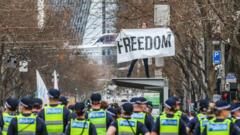Could a Manhunt in the Australian Bush Validate Dismissed Conspiracy Theories?

Published: 2025-08-29 23:35:19 | Category: technology
In the small Australian town of Porepunkah, a violent incident has sparked a massive manhunt and raised concerns about the growing influence of anti-government conspiracy theorists known as sovereign citizens. The tragic shooting resulted in the deaths of two police officers and has highlighted the dangers associated with these groups. As the situation unfolds, it underscores the need for a deeper understanding of the beliefs that fuel such violence and the measures necessary to address it.
Last updated: 28 October 2023 (BST)
Key Takeaways
- Porepunkah, a quiet town in the Australian Alps, is currently the focus of a significant police manhunt.
- Two police officers were killed during a routine search warrant related to a sex crimes investigation.
- The alleged shooter, Dezi Freeman, is identified as a "sovereign citizen" with a history of anti-government beliefs.
- This incident mirrors a similar ambush in Queensland three years ago, raising questions about police preparedness.
- Experts warn about the growing threat posed by pseudo-law believers in Australia and their potential for violence.
The Tragedy in Porepunkah
Nestled amid the scenic Australian Alps, Porepunkah is known for its wineries and serene atmosphere. However, this peaceful community was shaken on a fateful Tuesday when police arrived at Dezi Freeman's property to execute a search warrant. Instead of a routine interaction, officers faced gunfire, resulting in the deaths of two officers and the injury of another.
Neal Thompson, a local detective close to retirement, and Senior Constable Vadim De Waart were the fallen officers. Their tragic deaths have left the community in shock, with many residents expressing disbelief that such violence could occur in their town.
The Alleged Shooter: Dezi Freeman
Dezi Freeman, known legally as Desmond Filby, allegedly fled into the bush after the shooting. Reports indicate he was armed with multiple firearms, including an illegal homemade weapon and at least one stolen from the slain officers. His background as a sovereign citizen—a member of a movement that rejects established government authority—has drawn significant attention to this case.
Residents describe Freeman as part of a small cluster of individuals in Porepunkah who hold such beliefs. Despite appearing integrated into the community, there were whispers about his past and his anti-government sentiment. Freeman's actions have thrust these beliefs into the spotlight, prompting concerns about the broader implications of anti-authoritarian ideologies in Australia.
Understanding Sovereign Citizens
Sovereign citizens are individuals who believe that they are not subject to government laws and regulations. They often argue their positions using convoluted legal theories that have no basis in actual law. This movement is not unique to Australia; similar groups have been active in the United States for decades, with some classified as domestic terrorism threats by the FBI.
In Australia, however, the sovereign citizen movement has largely been treated as a fringe phenomenon. The perception began to change during the COVID-19 pandemic when strict government measures against the virus led to an increase in anti-government sentiment. This shift has potentially bolstered the ranks of conspiracy theorists, including those subscribing to pseudo-law beliefs.
The Consequences of Anti-Government Sentiment
The recent shooting in Porepunkah raises critical questions about how authorities in Australia respond to the growing threat of anti-government groups. Experts warn that the beliefs held by sovereign citizens can lead to a dangerous mindset where violence becomes an acceptable response to perceived injustices.
Dr Joe McIntyre, an academic who studies these groups, highlights the risks of selective law obedience, stating, "Once you start chopping and choosing which laws you're going to obey… you're starting to really abandon those core ideas that a democracy is built on." This sentiment reflects a broader concern that such ideologies can foster a culture of violence.
Comparisons to Previous Incidents
The Porepunkah incident is reminiscent of the Wieambilla shooting in Queensland that occurred three years prior. In that case, two young police officers were killed while attempting to check on a missing person. The offenders in that incident also adhered to extreme anti-government beliefs, highlighting a troubling pattern where police operations are met with violence from individuals with such ideologies.
Both incidents raise urgent questions about police training and preparedness when dealing with potential threats from sovereign citizens. Following the Porepunkah shooting, Police Commissioner Mike Bush faced scrutiny regarding what lessons have been learned since the Wieambilla tragedy. His response was limited, citing the ongoing nature of the investigation.
Community Impact and Fear
The fear and uncertainty gripping Porepunkah's residents are palpable. Emily White, who operates a family-run caravan park, expressed her disbelief at the turn of events, noting the community's typically safe environment. Such incidents disrupt the fabric of small-town life, where neighbours know each other and trust is a cornerstone of daily interactions.
As the manhunt for Freeman continues, local residents are left grappling with the reality that their town has become the centre of a violent narrative that has captured global attention.
The Role of Authorities and Future Considerations
Authorities in Australia are beginning to take the threat of pseudo-law groups more seriously. A recent Australian Federal Police report acknowledged the capacity of these groups to inspire violence, signalling a shift in how the government views this movement.
However, experts like Dr McIntyre argue that a more comprehensive approach is necessary. He advocates for better information sharing, increased education on legal systems, and addressing root causes that lead individuals to embrace anti-government ideologies. This includes improving mental health support and ensuring social services are accessible to vulnerable populations.
Cam Wilson, a journalist who has investigated sovereign citizens, raises concerns about the potential backlash of increased policing. He warns that harsh measures could entrench beliefs rather than deter potential violence. Addressing the underlying issues that foster these ideologies may be a more effective long-term solution.
Conclusion
The tragic events in Porepunkah serve as a stark reminder of the potential consequences of rising anti-government sentiment and the radicalisation of individuals within society. As the community mourns the loss of its police officers, it also reflects on the broader societal issues that allow such ideologies to flourish. Ensuring public safety while addressing the root causes of these beliefs will be crucial in preventing future tragedies and fostering a more cohesive society.
As Australia continues to grapple with these challenges, the question remains: how can authorities effectively counter the influence of anti-government ideologies without further alienating those who feel disenfranchised? #Porepunkah #SovereignCitizens #PublicSafety
FAQs
What is Porepunkah known for?
Porepunkah is a small town in the Australian Alps, known for its wineries, bushwalking opportunities, and serene atmosphere, which has now been shaken by recent violent events.
Who is Dezi Freeman?
Dezi Freeman, also known as Desmond Filby, is the alleged shooter involved in the recent incident in Porepunkah. He is identified as a sovereign citizen who has a history of anti-government beliefs.
What are sovereign citizens?
Sovereign citizens are individuals who reject the authority of established government and law, often using pseudo-legal arguments to justify their beliefs. They are active in both Australia and the United States.
How did the Porepunkah incident compare to previous shootings?
The Porepunkah shooting is similar to the Wieambilla shooting in Queensland, where police officers were killed by individuals with anti-government beliefs. Both incidents highlight the dangers posed by sovereign citizen ideologies.
What are the implications of the Porepunkah shooting for public safety?
The shooting raises significant concerns about the influence of anti-government ideologies in Australia and the need for authorities to address the root causes of such beliefs to prevent future violence.



